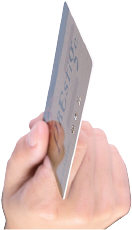Should a Christian have or use credit cards?

The answer to this question is not stated yes or no in the Bible. Outside of specific commandments, God instead offers principles which we are to implement in our lives. This is illustrated in parenting when a child is told to do something versus being offered a choice in the matter. When the child is young, and before sound judgment is developed, a parent will instead require obedience, rather than giving them the freedom to make their own decision—which will become the case once they are older and more and more capable. Similarly, God gives us principles, where He doesn’t give us commands, in order to govern our behavior that, when followed, will produce life-giving results in our lives. So what are the principles God offers surrounding the use of credit cards?
Let’s set a context for this idea that is of familiar use and comparable value. Can a Christian watch television, listen to secular music, or surf the Internet? Many of us have navigated these questions before in regard to our relationship with God. The consideration of the use of credit cards for the believer is similar. In the previous example, media in itself is not inherently evil and neither are credit cards. What these things are used for and our purpose in using them become important factors, though. A key question at the heart of this matter is this: Do you control your credit cards or do they control you? Perhaps more clarity will come as we take a look at what credit cards should NOT to be used for in our lives as believers.
Trust or Security
(1 Tim. 6:17) As Christians, we are to place our trust and security in God and not in credit cards. This does not mean that it is unwise to have savings or even an emergency credit card, if justified, but it should not be our security or constant “go to” in times of trouble. If you can trust a credit card to be there for you when times are tough, you can trust God to help you establish an emergency fund as well.
Budget Bridge
Jesus told the disciples to be practical in estimating their ability to complete a tower if they built one (Luke 14:28). Similarly, we should be practical in calculating a monthly income and expense budget and live within our means. If we have less money coming in than we have going out at the end of the month, using a credit card to bridge the budget is not a wise decision. This leads us deeper and deeper into debt. This is comparable to having a slow leak in a boat that is never patched. Over time, it will sink you.
Frivolous Purchases
Grandpa and Grandma didn’t buy large things if their current income couldn’t afford them, and neither should we. Why? When we use credit cards to purchase something we otherwise can’t afford, why should we presume upon God that He will later (or perhaps miraculously) supply for it? If you desire something beyond your present reach, that’s fine. Ask God to provide the means for it, instead of trusting in credit to get it.
If it’s His will for you to have it, I bet He can do it! (Matt. 7:7; 6:33)
To be fair, what are some good reasons for us to use credit cards?

Convenience
If I have the money to purchase something, I may choose to use my credit card instead of cash for convenience and expense-tracking sake. With the advent of debit cards, this point is almost obsolete. Debit cards carry the same assistance in ease of use, and some banks offer expense tracking services to help itemize your purchases, too. Nonetheless, I personally use my business credit card to keep my expenses separate from personal items for easy tax treatment, and I pay the balance off to avoid interest. This is one example of how a credit card can be useful. In most cases and for most individuals, it is still not necessary.
Purchase limitations
Some items may require a credit card, such as airline tickets, rental cars, or hotels. In these situations, it may become necessary to have and use a credit card. That said, debit cards can be used in many of these situations now and, therefore, replace the need for a credit card.
Rewards
This one shouldn’t be on the list, but I know some readers think it is a justifiable reason to use their credit card. Think about this for a minute. How do you think credit card companies are able to give you free stuff? It’s not free. You end up paying for it many times over with annual fees, a missed or forgotten payment with late fee, interest expense, or the fact that the merchant has made a special offer available to you knowing that when you cash in your rewards you just might end up spending more money on that visit or in your next one. (Since they have now steered your buying habits toward their products.) When it comes down to it, rewards programs are not a justifiable reason to get into the habit of using your credit card. (Psst… that is the reason they offer rewards programs… to get you in the habit of using their card.) Later, when they cancel the reward program, guess who will be rewarded? Their hope is that you are still in the habit of using their card. Now you’re on to them!
For many individuals, the pro’s of using credit cards fall way short of the con’s. For others, Jesus’ words become applicable. “If your eye (credit card) causes you to sin (make decisions that you otherwise wouldn’t make that lead to your detriment), cut it out (up)” (Matt. 18:9). This is good advice, as self-control and self-discipline are the crux to evaluating one’s credit card use. If I can shop and not view my credit card as “extra money,” and if I never exceed my budget due to credit card purchases, maybe the convenience of having one is worth it. However, if having a credit card causes me and my family financial hardship, due to my lack of self-control—or high interest expenses because I am not disciplined to pay it off each month, it’s probably best if I get rid of it.

Sadly, many people know credit cards have become a problem, but are now stuck with the balances nonetheless. If this describes you, you’re not alone. The Federal Reserve states the total US consumer debt (excluding mortgage debt) reached $2.46-trillion in June 2007, up from $2.398-trillion at the end of 2006. Additionally, revolving debt (credit cards) reached $904-billion in June 2007 (Source: Federal Reserve). Many Americans are facing mounting credit card debt and agree they need out, but they don’t know where to turn. Even worse, some in the body of Christ feel called to pursue God’s will but can’t, due to the shackles of credit card debt. Where do we turn?
3 steps to begin with to escape the bondage
Ask God to help you get to a place where your monthly income exceeds your monthly expenses. Additional income can result from working more hours, learning a new skill or acquiring more education or certification that leads to a promotion or new career. This could simply mean a new opportunity. God is big; He can help you with this, if you ask Him.
Establish a plan. You will need a budget to get a handle on your expenses. An unplanned grocery amount becomes a larger grocery amount, so determine your limits before going. You can always make adjustments, but without a plan you will surely spend more each month.
Tackle the debts. Depending upon the type and amount of debt, you can either “snow-ball” debts or create a prioritized pay-down schedule based on interest rates and/or amounts. If the amount is very large, perhaps you should seek a program that deals specifically with debt reduction. Debt consolidation or debt settlement may be good options for you, but you should work with a reputable company.
Face the facts, and get the help you need, but also be encouraged. No matter what your situation, God has a way out for you (1 Cor. 10:13). The issue is that you have to seek Him for it. The specific way out can widely range from supernatural to practical things, because God is a big God. However, there is something required on your part to initiate the process.
The first step is to ask for assistance. Start by asking God for help. Ask Him to take charge of your finances, to help you make wiser choices in your budget and spending, and for Him to send the right people to help you. I’m sure you’ve seen this produce results in other areas of your life. Why would it be any different when it comes to your finances? Take some time to pray right now.
Second, if you need advice, seek someone who has fruit in their life in this area and who also has your best interest at heart. If you don’t know of anyone off hand, ask the Lord to connect you and He will be faithful to do so.
Information on related topics
How can I spend my money more wisely? Answer
Does the Bible share any wisdom about investing? Answer
How can I know what is right and wrong? Answer
How can I decide whether a particular activity—such as smoking, gambling, etc.—is wrong? Answer
Author: Brant Scheifler. Text Copyright © 2008, Brant Scheifler.